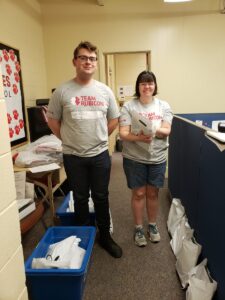When Peoria Public Schools closed its campuses in late March in response to COVID-19 and moved classes online, the district knew that many students wouldn’t have access to the necessary technology. With a high poverty rate—more than 70% of students are low-income—resources at home could be stretched thin for many families. So, it created a laptop check-out program so that no kid would have to miss out on learning. But then, there was the challenge of getting thousands of devices delivered to the children in need.

Before social distancing and mask requirements, Aaron Coulombe and Dawn Rademaker prepare for a delivery.
Enter Lucy Loftus, a Team Rubicon volunteer leader for Peoria, who included the laptop delivery program in an email to local Greyshirts. In stepped a cadre of volunteers, including Karl Newman, who works in law enforcement and served in the Marine Corps Infantry from 1997 to 2007. The former Marine turned laptop deliverer even went to some of the schools in the district when he was a kid.
Making Deliveries, Day and Night
To get the tech to students, the volunteers would pick up boxes of computers at different schools in the area. Inside were multiple laptops, each labeled with the name, address, and phone number of the family it needed to reach. When the volunteers delivered the computer, an adult would have to sign for the device. Dawn Rademaker, a local videographer and dog walker who had retired from the National Guard in December of 2017 after 26 years (“with four years of active duty in the middle”), acknowledged that the process of getting those computers to people in need was impromptu, and sometimes imperfect. She’d often call families to schedule a delivery, but get no answer, so eventually, she’d arrive unannounced.
Most people were home when Rademaker arrived, but others were harder to reach. So, the Greyshirts organized deliveries after their volunteer shifts ended to make sure everyone was getting the technology they needed. “There was one parent who worked till 7 p.m. so no adults were home [to sign for the device],” Rademaker remembers, “and she didn’t have transportation to get to the school to pick it up. So, I held onto it and delivered it to her that night. She was very appreciative.”
An EMT/Nursing Student Arrives at the Door
For Aaron Coulombe, a full-time nursing student at Bradley University who also volunteers with the West Peoria Fire Department as a firefighter and EMT, the device delivery program gave him another opportunity to help during the coronavirus pandemic. “I have a desire to serve in any way that I am able to,” said the Greyshirt. “Fitting deployments into my schedule as a college student is hard, especially as a nursing major. Delivering laptops is an easy way for me to benefit the city that I call home during my time at college.”
Most of the parents were just surprised when he’d show up at their door with a laptop in hand. “They saw a 20-year-old college student taking time out of his day to deliver laptops to their children so they could continue their education. It’s something that this city does not see that often.”
With the majority of computers delivered, the program is winding down now. But if it was short-lived, it made a lasting impact. “I remember one child telling me that they were super excited to be able to go to school [albeit remotely] again because they were so bored at home,” said Coulombe.
With the delivery program over, Rademaker has been looking for other opportunities to serve her Peoria-Canton community. She has volunteered delivering meals to the elderly with Meals on Wheels and helped make pallets at the Midwest Food Bank for a couple of days. Meanwhile, Coulombe says that reaching out proactively is also a good strategy for finding ways to volunteer. “The biggest thing that I have been telling everyone that I encounter is to just call up organizations that you know and see if they need any help.”



